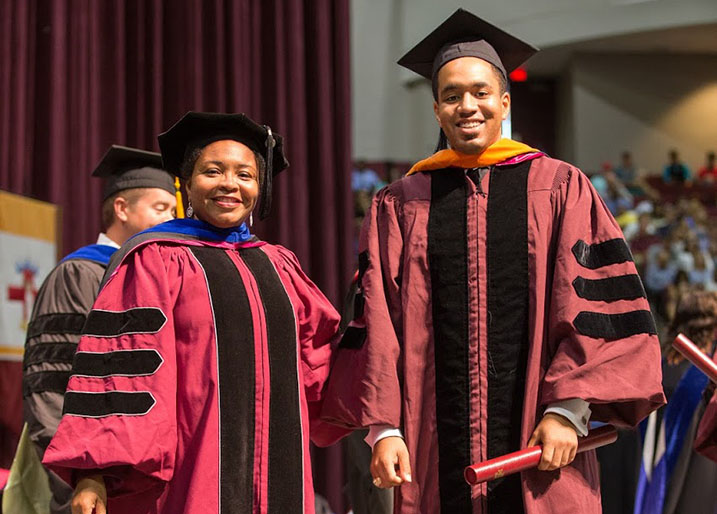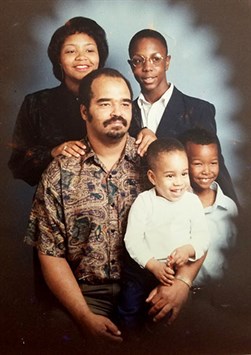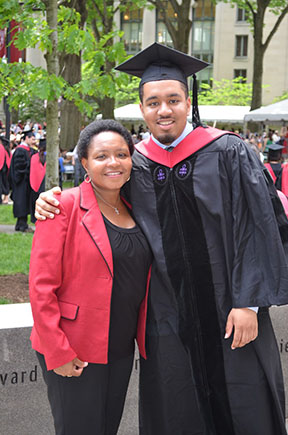
Young and driven. Both are words that could describe Dr. Cortlan Wickliff. At 26 years old, Wickliff is an engineer, licensed attorney, business owner, motivational speaker and author. Perhaps more important, however, is his desire to help others and inspire the next generation of thinkers and doers.
Making history
When Wickliff was in third grade, he wrote a paper about Dr. Martin Luther King Jr. that motivated him and propelled the trajectory of his life.
“I found out that he got his Ph.D. when he was 26 years old, and from that moment on I was inspired,” he said.
Competitive in nature, Wickliff set out to earn his Ph.D. by 25, a feat he accomplished last summer when he received his doctoral degree in interdisciplinary engineering at Texas A&M University four days before his 26th birthday. To get there, Wickliff skipped a grade in elementary school, and at 15 was admitted into a program at the University of North Texas that allowed bright high school students to gain early entrance into the university. He eventually transferred to Rice University where he earned a degree in bioengineering, graduating at 19 as the youngest engineer in the nation. From there, Wickliff went to Harvard Law School, becoming one of the youngest African-American graduates in the history of the school at age 22. The following year he made history again by becoming the youngest barred attorney in the state of Texas.
These days, he travels the country speaking to young people about his tools for success, all while starting his own business, doing legal work and consulting for other business owners. He also wrote a book, “Young and Driven.”
Where it began
 While Wickliff’s mother, Dr. Tanya Dugat-Wickliff, is an engineering professor of practice at Texas A&M, Wickliff said his earliest scientific inspiration began in his father’s auto body shop.
While Wickliff’s mother, Dr. Tanya Dugat-Wickliff, is an engineering professor of practice at Texas A&M, Wickliff said his earliest scientific inspiration began in his father’s auto body shop.
“He was a mechanic and would let me play with power tools and take things apart,” he said.
Later, during Wickliff’s elementary years, he would go with his mother to her Master of Business Administration courses. Wickliff was bright, even as a young child, and his mother’s classmates would allow him to participate in class projects. When she began working on her Ph.D. at Texas A&M, Wickliff again came to many of her classes and conferences. He said he was able to communicate effectively at a very young age, partly because the people who surrounded him did not water things down.
“It’s something we often overlook and don’t think is important, but when dealing with kids — even as early as elementary all the way through high school — if you talk to them with a certain level of maturity and expect a lot out of them, they tend to rise to your expectations,” he said.
Wickliff certainly rose to his parents’ expectations. Last summer when he graduated from Texas A&M with a Ph.D., it was his mother who waited at the end of the stage to hood him. It had all come full circle.
Making a difference
When Wickliff was a child, his father died of a heart condition at the age of 40. This tragedy inspired Wickliff to study bioengineering, in the hopes that he could help prevent others from dying of preventable causes. At Rice, Wickliff was able to help develop cardiorespiratory monitors for doctors in developing countries.
“There are a lot of people who die every day from easily treatable, easily preventable problems,” he said. “It’s just that doctors are overwhelmed trying to manage patient loads.”
 In the end, his goal is to make health care more accessible and more affordable for people around the world. As an attorney, he hopes to make it easier for new technology to be available on the market.
In the end, his goal is to make health care more accessible and more affordable for people around the world. As an attorney, he hopes to make it easier for new technology to be available on the market.
Be the trailblazer
Wickliff said it’s important to be a trailblazer, especially as an African-American engineer.
“People have looked at my skin color and made snap judgments about my intelligence or capabilities,” he said. “That’s always a challenge to overcome.”
But Wickliff said it’s important to never be afraid of being the first person of color to work at a company.
“Don’t be afraid to be that trailblazing person,” he said. “And make sure that when you do, you reach back and you don’t be the only person, you bring more people with you.”
Wickliff said more and more companies recognize the importance of having different cultures represented in their companies, and that it’s important
for African-American, Latinx and other minority groups to be interested in science, technology, engineering and mathematics.
“It’s a field where you have a lot of job security and a lot of opportunities to provide for yourself and your family, and in the end that’s what it’s all about,” he said. “I define success as being able to positively impact those around you. The most lasting memories are always of those people who made your life better.”